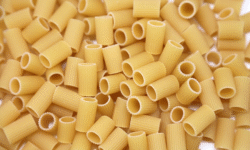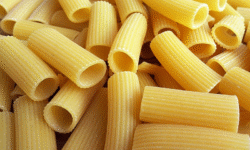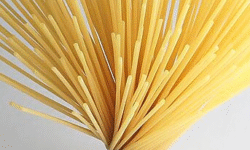Semola
Food, Plant source foods, Flours, Semolina, Durum wheat semolina
Consumption area(s): Italy 🇮🇹, San Marino 🇸🇲, Vatican City 🇻🇦

Protein percentage: 10.5%
Maximum ash percentage: 0.90%
Introduction
In Italy, primary milled product obtained from durum wheat is known as semola. Under Italian law, semola must contain only a limited proportion of fine particles below 180 microns.
Description of semola
Traditionally, semola production was concentrated in Southern Italy, but it has now become widespread across the entire country. It differs from soft wheat flour not only in its coarser grain size but also in its distinct amber-yellow hue, a color that is transferred to the final products made from it. Semolina is mainly employed in the production of pasta, where its texture and pigment contribute to the typical appearance and quality of Italian pasta.
Nutritional facts table
Please note that nutritional values may vary slightly depending on the individual producer.
| Nutrients | Per 100 g |
| Calories (kcal) | 345 |
| Total fat (g) | 1.2 |
| ———Saturated fat (g) | 0.4 |
| Cholesterol (mg) | 0 |
| Sodium (mg) | 2 |
| Total carbohydrates (g) | 70.5 |
| ———Dietary fiber (g) | 2.2 |
| ———Total sugar (g) | 1.9 |
| Protein (g) | 12 |
Recipes that use this product as an ingredient:
Source(s):
https://it.wikipedia.org/wiki/Farina
Photo(s):
1. PilotChicago, CC BY-SA 4.0 https://creativecommons.org/licenses/by-sa/4.0, via Wikimedia Commons



